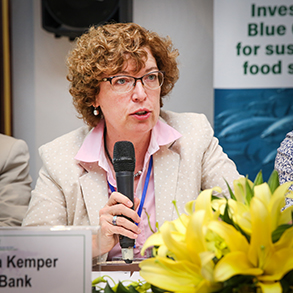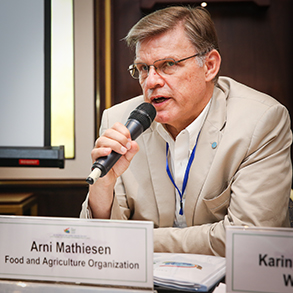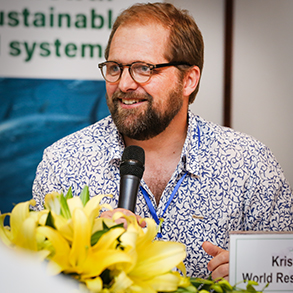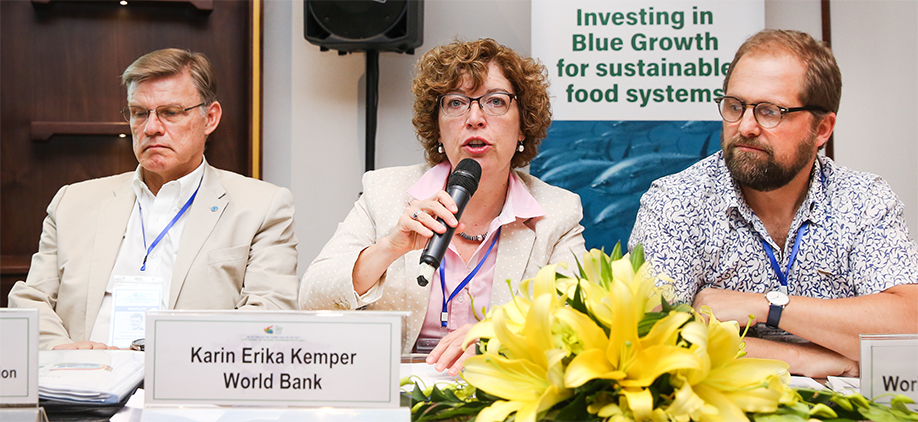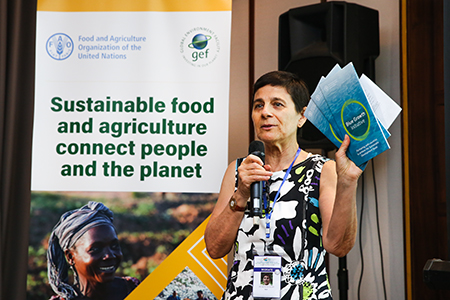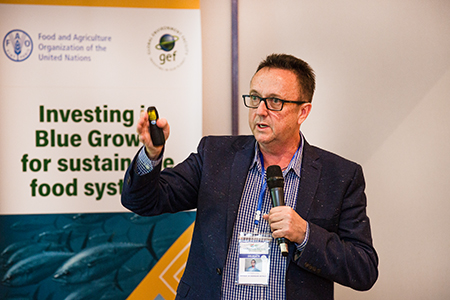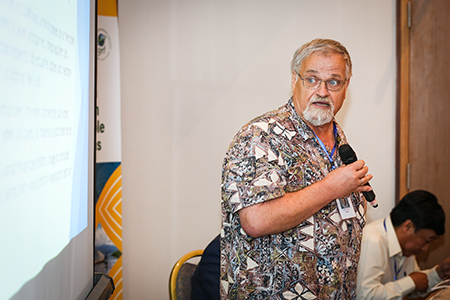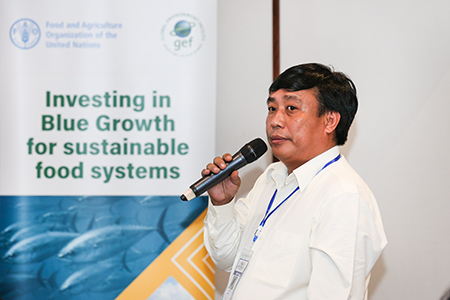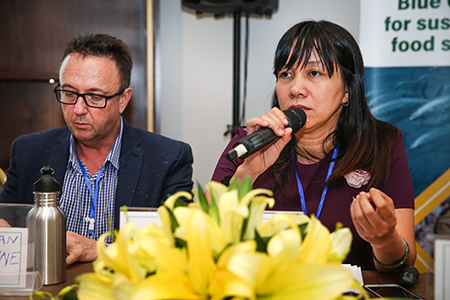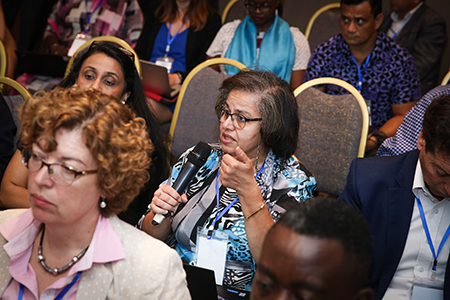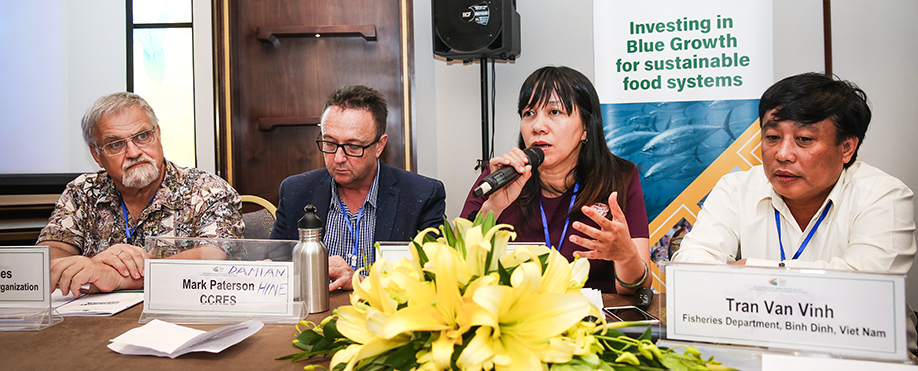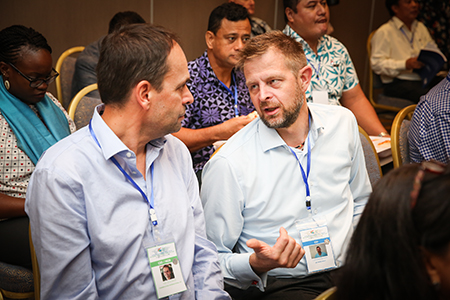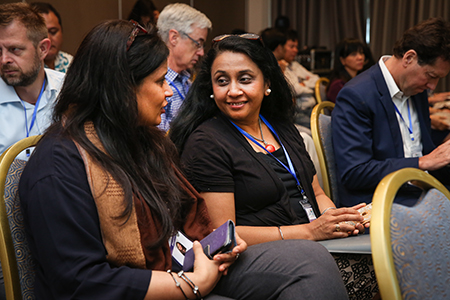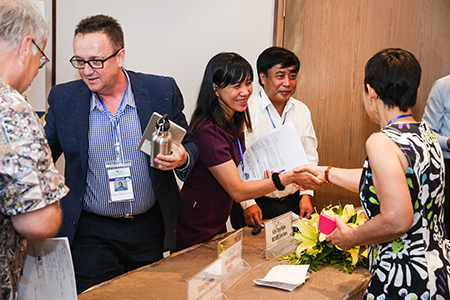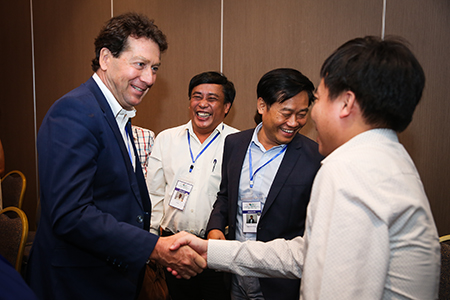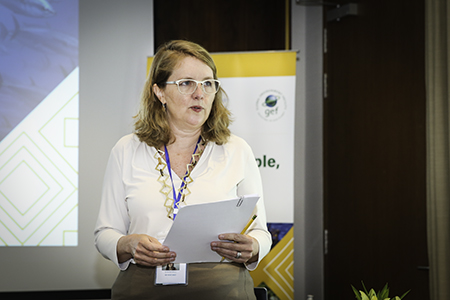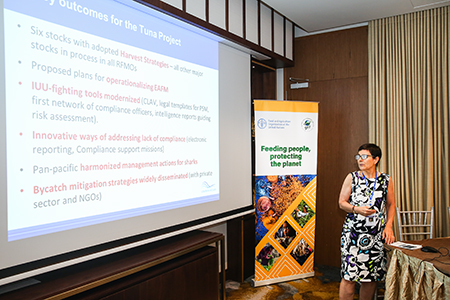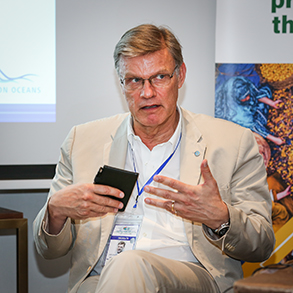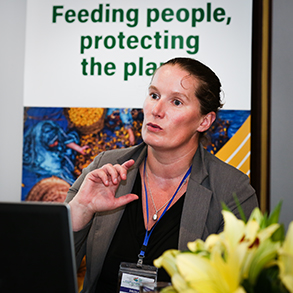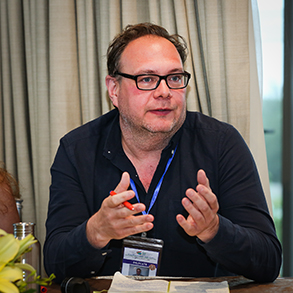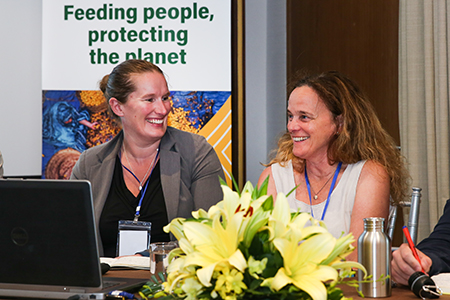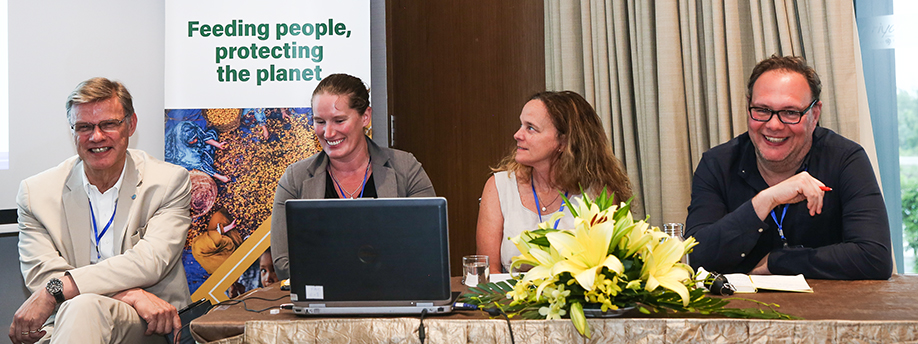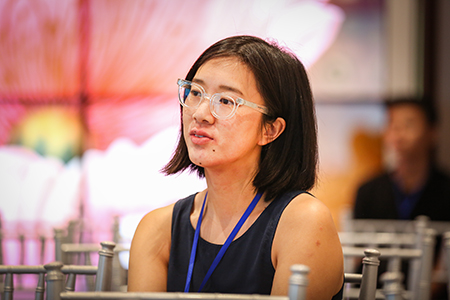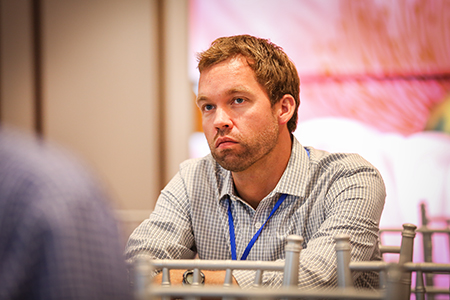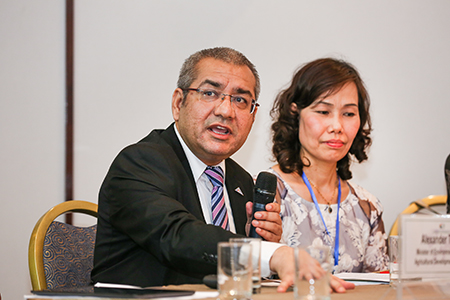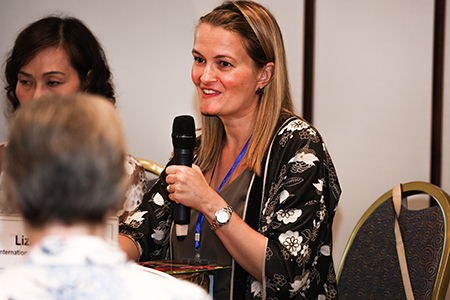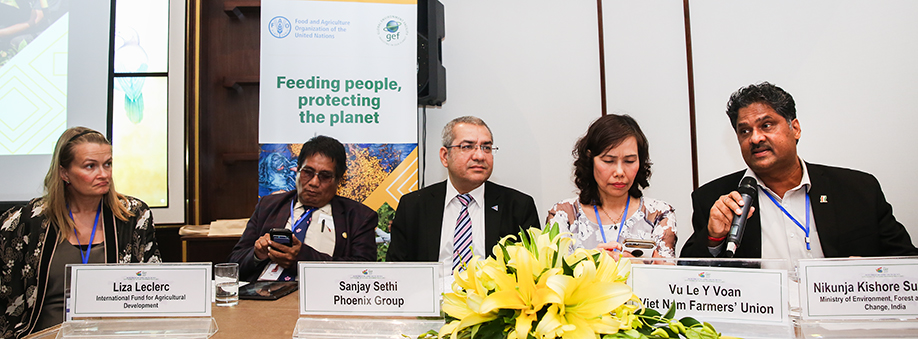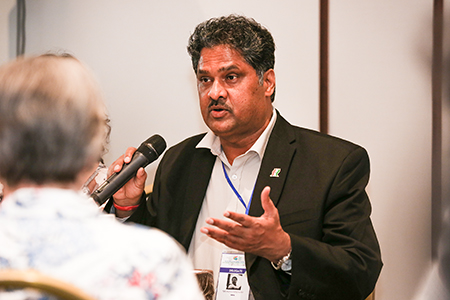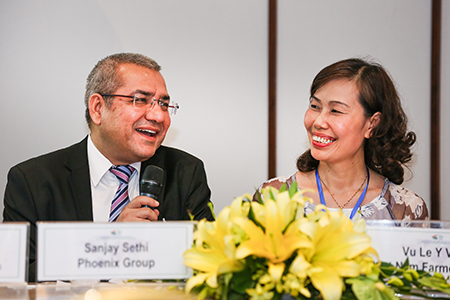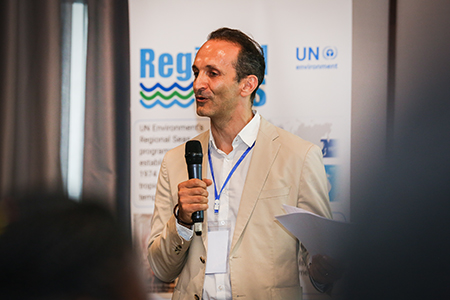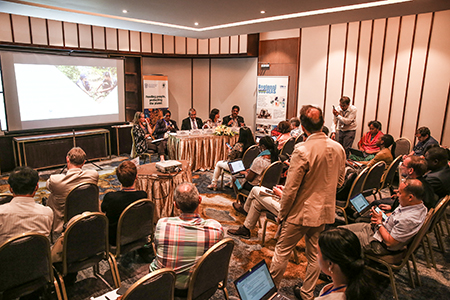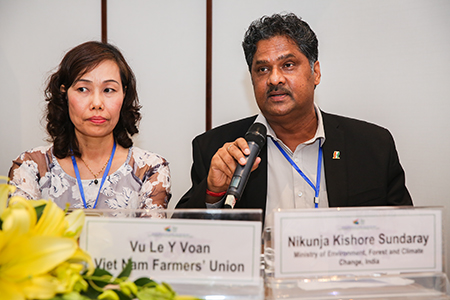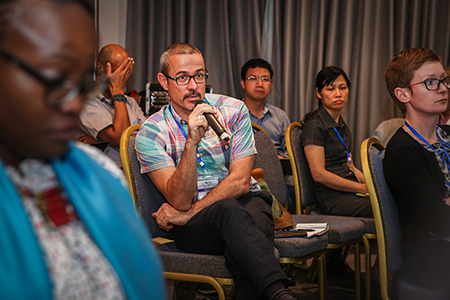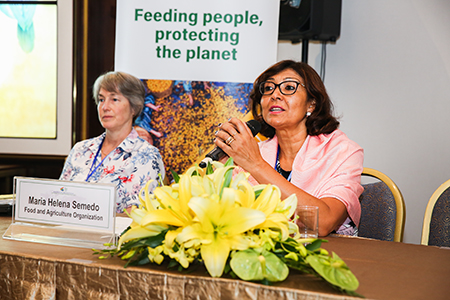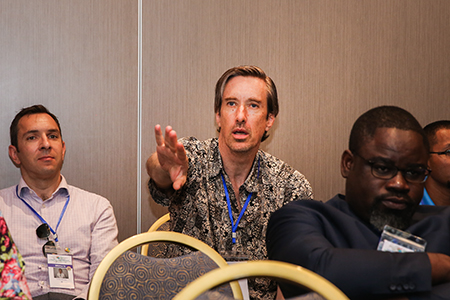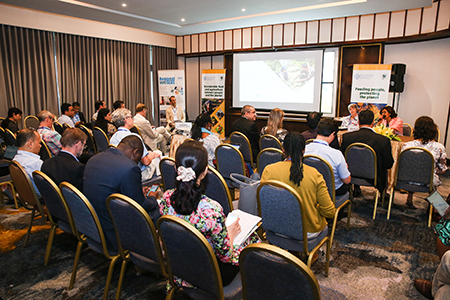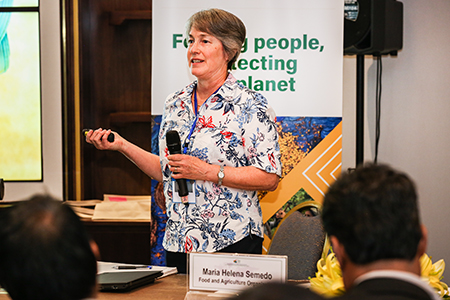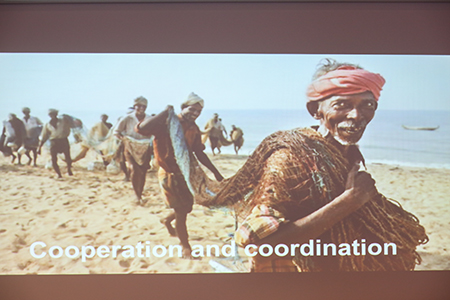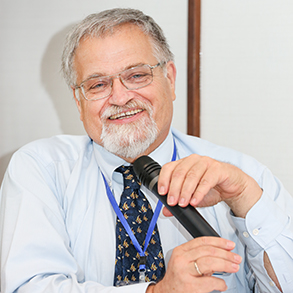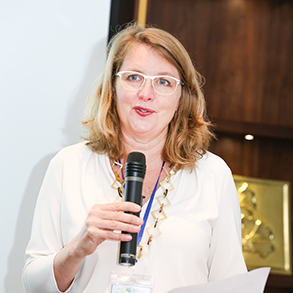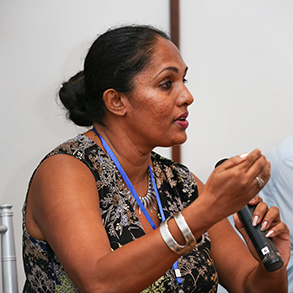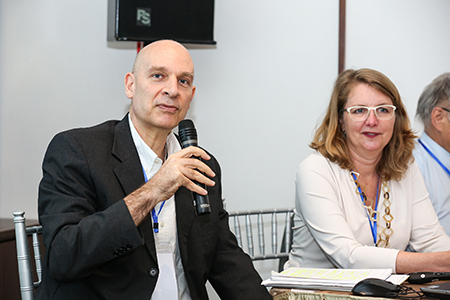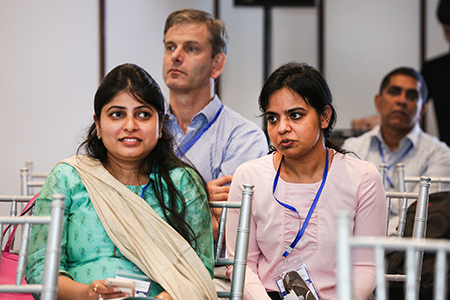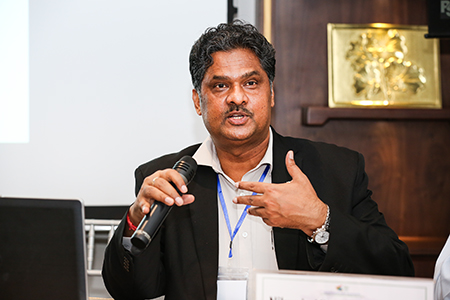Coverage of Side Events Hosted by the Food and Agriculture Organization of the UN (FAO) During the Global Environment Facility (GEF) 54th Council Meeting
24-26 June 2018 | Da Nang, Viet Nam
Events Covered on Tuesday, 26 June 2018
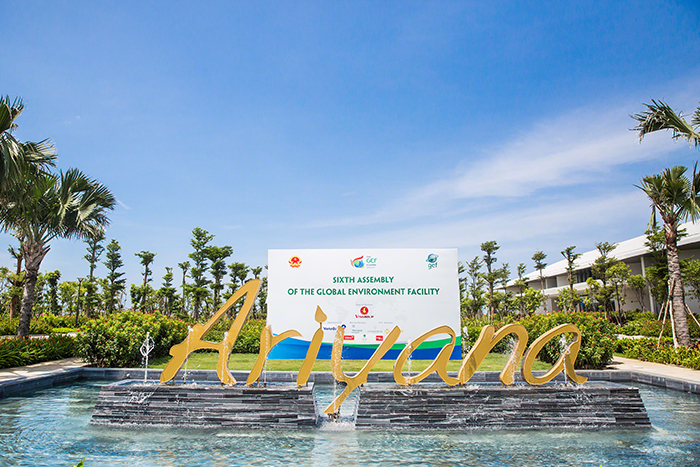 |
||
|
The following events were covered by IISD Reporting Services on Tuesday, 26 June 2018:
|
||
|
IISD Reporting Services, through its ENB+ Meeting Coverage, provided daily web coverage of side-events from the side events hosted by FAO during the 54th GEF Council Meeting. | ||
Blue Economy - Adding Value and Scaling up GEF-7 Impacts
|
This side event was held on Tuesday, 26 June 2018, and showcased stories from FAO's Blue Growth projects and activities, an FAO investment that represents a version of the Blue Economy focused on leveraging FAO's wide-ranging expertise in fisheries and aquaculture. Panelists exchanged experience, knowledge, tools and understanding of the Blue Economy, and looked at opportunities to scale up actions through innovative financing mechanisms and including the private sector. Jacqueline Alder, Fishcode Manager, FAO, moderated the session. In her opening statement, Karin Kemper, Senior Director, World Bank, shared that the Bank's Blue Economy portfolio is approximately US$2.6 billion, and highlighted that client country requests for support on instituting Blue Economy policies have increased. Árni Mathiesen, Assistant Director-General, Fisheries and Aquaculture Department, FAO, described the link between environmental and humanitarian challenges, noting, for instance that 90% of those affected by the problems associated with overfishing and related biodiversity loss are in developing countries. In his address, Kristian Teleki, Director, Sustainable Ocean Initiative, World Resources Institute (WRI), described the Blue Economy, underlining that the ocean's contribution of US$2.5 trillion a year to the world economy, bolsters economic growth and food security. He said that the Blue Economy is not replacing the Green Economy, and does not justify overexploitation of ocean resources. He outlined that a new ocean economy contributes to sustainable livelihoods and food security, drawing attention to the negative consequences to the biodiversity and livelihoods of a business-as-usual approach. Damian Hine, Capturing Coral Reef and Related Ecosystem Services (CCRES) project, spoke about the CCRES project supported by the GEF, outlining a range of both practical and analytical tools to build an evidence base that will inform policies and improve coastal ecosystems. He highlighted tools related to: system simulation of the future; business development tools to utilize plastics for enterprising purposes; developing effective governance processes; and promoting behavior change. Kim Thi Thuy Ngoc, Institute of Strategy and Policy on Natural Resources and Environment (ISPONRE), Viet Nam, presented on the role of natural capital accounting in Vietnam's's Blue Economy Strategy, outlining that Viet Nam has a good policy framework to promote the blue economy. She highlighted that to promote the blue economy, it is important to: integrate the intangible values of marine resources into all aspects of economic activities; define a pathway to support the growth of a country's blue economy; and identify sustainable development options. Rudolf Hermes, FAO consultant, outlined the Action Platform for 'Source-to-Sea' Management (S2S Platform), a new approach to the Blue Economy, highlighting that this multisectoral approach is aligned with GEF-7 programming. He stressed that good governance is still a key prerequisite to sustain economic growth, noting that the governance for a 'Source to Sea's' approach is currently fragmented, involving large-marine ecosystem approaches, regional-seas programmes and international efforts under the UN Convention on the Law of the Sea. Speaking on FAO's 'Source to Sea's'; approach in the Asia Pacific, he noted that it uses water as an entry point for tracing ecosystem flows and developing multidisciplinary investments that cover multiple sustainable development goals. Vinh Van Tran, Vice-Director, Fisheries Department, Binh Dinh Province, Viet Nam, highlighted fisheries co-management and marine spatial planning in his presentation on the Vietnam Coastal Resources Project. He shared successes and lessons learnt in co-management of the Binh Dinh fisheries, discussing the risks faced by the sector including pollution and overfishing. He highlighted that the GEF-funded project involved the preparation of an action framework, and resulted in building management capacity for local communities, as well as the development of legal frameworks for fisheries co-management. In the ensuing discussion, participants considered, inter alia: how the different tools and projects presented relate to the grey economy; how to conduct blue-economy projects within the International Waters focal area; and definitions of the blue economy. |
||
|
|
|
|
|
|
|
|
|
|
|
|
|
Common Oceans or Marine Areas Beyond National Jurisdiction (ABNJ) Program: Achievements So Far and Looking Ahead
This side event took place on Tuesday afternoon, and aimed to: inform GEF participants about the progress towards expected outcomes of the programme; share lessons learned; and propose some ideas regarding opportunities for future investments under GEF-7 to consolidate and further progress towards a long-lasting impact. Leah Karrer, Senior Environmental Specialist, GEF, introduced the session, noting that despite the enormous economic significance of the high seas, the ABNJ program was the first major international programme in this area. She pointed to the four Common Oceans projects’ success in leveraging US$275 million in co-financing. Rosina Bierbaum, GEF Scientific and Technical Advisory Panel (STAP) Chair, reminded participants of the significance of work under the ABNJ Program, in building capacity throughout regions to support international cooperation on the common oceans and in supporting work also being done to introduce an international agreement on Biodiversity in marine areas Beyond National Jurisdictions (BBNJ). Jacqueline Alder Fishcode Manager, FAO, gave a presentation on the lessons learned since the Common Oceans Program commenced in 2014-15. She highlighted that the projects under the programme were coming towards their conclusion in 2019 and FAO would look to carry these lessons learned into better design of GEF-7 programs, including in relation to: where the programme's eight regional fisheries management organizations (RFMOs) would benefit from further capacity building; strengthening RFMO engagement on marine spatial planning: updating 2008 guidelines on deep sea management drawing on current scientific findings; encouraging greater political commitment on tuna by RFMOs; the market for sustainable fishing has developed rapidly since the program commenced; governance of ABNJ programs may need to be reviewed; and appropriately managing the high seas’ fisheries operations is of critical importance to small island developing States. She also pointed to the yellow/red card system for management of illegal, unreported and unregulated (IUU) fishing as an incentive to countries to improve their performance in this area. Árni Mathiesen, Assistant Director-General, Fisheries and Aquaculture Department, FAO, commented that the four projects had worked remarkably well, particularly in forging connections whereby FAO now work closely with diverse stakeholders ranging from the World Bank to WWF and other Civil Society Organizations. He highlighted that bureaucracy required large time investment, with several years of preparatory work required in the case of tuna and deep sea fishing activities, but the end result had been worth it. Valerie Hickey, Biodiversity Specialist, World Bank, praised FAO’s leadership, particularly as large-scale fishing in the high seas is a private sector operation which public bodies are not very expert in. She pointed to four areas where the private sector was looking for public sector input: regulatory framework; investment credibility; infrastructure; and access to finance. She noted that the inability to price risk in the fisheries sector, in relation to harvest sizes, had led to over-investment in fleet sizes. Lauren Spurrier, Managing Director, Oceans, WWF, complimented FAO’s strong project management and noted the importance of designing interventions that demonstrate early impacts, as the project on tuna has done. She also noted the need to be flexible in project delivery in the face of unexpected obstacles. Steve Fletcher, Chief Strategy Officer, Marine Programme, UN Environment’s World Conservation Monitoring Center (WCMC), highlighted the challenges of: regional sea bodies that struggle to focus on management beyond their territories; compiling a data compendium accessible to everyone, specifically regarding ABNJ characteristics; and lack of communication between the different regional bodies. In conclusion, panelists were invited to express their wishes for the ABNJ program, with Fletcher noting the need to convince regional sea organizations of their dependence on the waters beyond their boundaries. Hickey emphasized the importance of face-to-face interaction between the stakeholders, which act as places to share ideas, almost like "therapy groups.” Spurrier stressed the need to pre-identify locations where knowledge sharing will occur. |
||
|
|
|
|
|
|
|
|
|
|
Transformational Change in Food Systems and Land Use: A Focus on Smallholders and Value Chains
|
This side event explored transformational change in the context of the new GEF-7 Food Systems, Land use and Restoration Impact Programme by looking at smallholders and value chains. Opening the session, Maria Helena Semedo, Deputy Director-General Climate and Natural Resources, FAO, underscored that food and agriculture systems are no longer sustainable and require transformational change to feed a population that is set to rise to 9 billion by 2050. She underlined the need for a multi-stakeholder partnership to develop a sustainable solution to feed and protect the planet, and noted that farmers are key to finding an innovative solution towards a world without hunger. Vincent Martin, FAO Representative in China, moderated the panel discussion, noting that although people produce enough food to feed the planet, 800 million people nonetheless suffer from hunger, while there is a growing number of obese people. He said that the effort it takes to produce food is no longer valued, and noted that food waste is an illustration of this. In a keynote presentation, Annette Cowie, Scientific and Technical Advisory Panel (STAP), GEF, spoke on pathways to sustainable land-use and food systems. She described the Take-Make-Waste system in the current food and agriculture production patterns, explaining how this system contributes to greenhouse gas emissions both at the farm level and at the consumer level. She called for a circular economy food system, governed by sustainable agricultural principles such as sustainable land management. Alexander Teabo, Minister of Environment, Lands and Agricultural Development, Kiribati, supported a multi-stakeholder approach to transformational change in food systems and land use, noting that as a small island developing State, Kiribati has limited lands and transformational change capability to improve food security. He emphasized the important role of traditional knowledge in farming and fishing, saying it has been the bedrock of the country's food security, but lamented that there is a growing dependence on food imports that is threatening this. He also pointed to the role of climate change and sea-level rise on the productivity of the land, which he noted delays or eliminates access to locally-sourced foods. Nikunja Kishore Sundaray, Joint Secretary (GEF-Operational Focal Point), Ministry of Environment, Forest and Climate Change, India, noted that India has 2% of the world's arable land but produces food for 18% of the global population, highlighting that with climate change affecting rain-fed agriculture, the country is relying more heavily on irrigation. He highlighted a GEF-6 project on green value chains, which also includes a school-feeding programme. He also spoke on the importance of recovery of degraded lands in India, and noted the importance of family farms to food security. Vu Le Y Voan, Advisor to the Viet Nam Farmers' Union, highlighted that farmers have been trained in applying good agricultural practices. Noting that this is an example of behaviour change, she said good agricultural practices introduced by the government have translated into better local-level organization and land management. She also underscored the need to include the consumer, the private sector, local government and scientists to ensure a sustainable value change. Liza Leclerc, Lead Technical Specialist, International Fund for Agricultural Development (IFAD), spoke on innovative financing in the context of transformative change in the food value chain. She noted that extreme poverty has been slowly decreasing, but food poverty has been increasing due to environmental degradation and climate change. She lamented that smallholder farmers have the greatest challenge in accessing finance. Noting that remittances are a significant portion of investment finance, she said that there is a need for partnerships to promote remittance flows towards smallholder farmers. Sanjay Sethi, Director Sustainability, Phoenix Group, shared that on a panel of the World Business Council on sustainable development, he heard that businesses should be profitable but also make an impact. He noted that the world food system is broken with smallholders under threat, imports on the rise, and deforestation increasing, and said that when it comes to actually solving global environmental problems, the private sector is always the last to speak even though they may be the best-placed to advise governments on the way forward. Stressing that business people are in the business of food security from the perspective of profit, he underlined that agricultural public planning processes could benefit from business thinking. In the ensuing discussion, participants considered the role of the GEF in transforming food systems; and how to incentivize the private sector to engage in the transformation of food systems. |
||
|
|
|
|
|
|
|
|
|
|
|
|
|
The Bay of Bengal Large Marine Ecosystem: Reconfirming the Commitment to Collaborate for Sustainable Management
|
This side event took place in the evening, and provided an opportunity for participating countries of the Bay of Bengal Large Marine Ecosystem (BOBLME) Strategic Action Programme (SAP) to re-affirm their commitment to the programme in its next phase, including by: presenting key outcomes from the SAP Phase 1; sharing key features of the programme framework for Phase 2; and providing guidance for Phase 2 implementation. In opening remarks, Rudolf Hermes, FAO consultant, explained that the objective of the event was to expand the programme partnership and solicit inputs from participants for developing the second phase of the SAP. He noted that the GEF Council has approved funding for SAP at its 54th meeting and adopted the large marine ecosystem approach in its portfolio on international waters. Keynote speaker Sevvandi Jayakody, Wayamba University, Sri Lanka, shared achievements of the first phase of the project, including: increased knowledge for evidence-based decision making on ecosystem management; enhanced local and sub-regional capacity on science communication and ecosystem management planning; strengthened cooperation and coordination across countries and institutions that led to good governance, including improvement on legislation; and conflict intervention through transboundary stock management. She also indicated opportunities for an expanded partnership in the new phase of the SAP to build resilience and thus ensure ecological and human wellbeing. Partner organizations and participating countries delivered messages. Leah Bunce Karrer, Senior Environmental Specialist, International Waters, GEF Secretariat, identified aspects she said make the BOBLME “monumental”: the ecosystem’s ecological and socioeconomic importance, including through provision of livelihoods to 3.7 million people and food for 400 million; the programme’s success in transboundary multinational cooperation; and the programme’s emphasis on knowledge management and capacity building. Daniele Ponzi, Chief of Environment Thematic Group, Sustainable Development and Climate Change Department, Asian Development Bank (ADB), indicated that the ADB expects to partner with BOBLME through its waste management projects in the city of Mandalay in Myanmar, and hopes to support knowledge sharing, replication and upscaling of these investments in other cities and beyond. Highlighting that half of India’s 7,500 km coastline are on the Bay of Bengal, Nikunja Kishore Sundaray, Joint Secretary of the Ministry of Environment, Forests and Climate Chang, India, expressed his country’s commitment to be an active participant in the BOBLME. He drew parallels between the BOBLME and the World Bank-supported Integrated Coastal Zone Management, noting that both have in place strong implementation mechanisms. Bunce Karrer noted that GEF-7 places more importance on plastic than during previous replenishment periods. Hermes added that the FAO will continue a dialogue with the GEF Secretariat to explore the possibility of including projects on marine plastic waste under the BOBLME. On a BOBLME coordination mechanism, Hermes said that while countries had not been ready to commit to an institution at the end of the first phase, the second phase includes plans to establish a consortium. Hermes closed the event, noting that enthusiasm in committing to the second phase of BOBLME was noticeable in the meeting and came across in all messages. |
||
|
|
|
|
|
|
|
|
|


